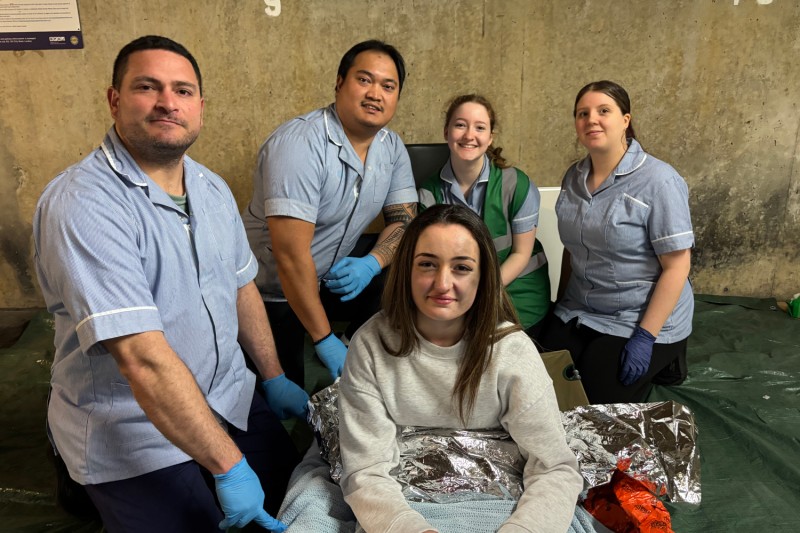Course fees
£1,075.00
For fees and funding info please refer to the FAQs
06 Oct 2025 (Intake closed)
Apply by: 25 Aug 2025
Oct 2025 (1)
Face to face | Pre booked spaces only
Attendance dates: 06 Oct 2025, 13 Oct 2025, 20 Oct 2025, 27 Oct 2025, 03 Nov 2025, 18 Nov 2025, 19 Nov 2025
27 Oct 2025 (Intake closed)
Apply by: 22 Sep 2025
Oct 2025 (2)
Face to face | Pre booked spaces only
Attendance dates: 27 Oct 2025, 03 Nov 2025, 17 Nov 2025, 24 Nov 2025, 01 Dec 2025, 05 Jan 2026, 07 Jan 2026
09 Feb 2026 (Intake closed)
Apply by: 05 Jan 2026
Feb 2026
Face to face | Pre booked spaces only
Attendance dates: 09 Feb 2026, 16 Feb 2026, 23 Feb 2026, 02 Mar 2026, 09 Mar 2026, 23 Mar 2026, 24 Mar 2026
11 May 2026 (Available)
Apply by: 30 Mar 2026
May 2026
Face to face | Pre booked spaces only
Attendance dates: 11 May 2026, 18 May 2026, 01 Jun 2026, 08 Jun 2026, 15 Jun 2026, 29 Jun 2026, 30 Jun 2026
Accredited by




Course overview
This clinically-focused unit has been developed in response to the need to enhance the assessment skills of healthcare professionals across the health and social care sector. The unit offers the opportunity for healthcare professionals to enhance their skills in the assessment of adult patients and further develop their knowledge in the relevant pathophysiology applied to stages of the assessment. As a result this will enable healthcare professionals to be able to confidently undertake a consultation of a presenting patient, perform an assessment utilising enhanced skills, identify any relevant red flags through their assessment, interpret the findings of their assessment and consider the relevant escalation and action plans, specific to the sector in which they are based.
Indicative Content
- Approaches to person-centred consultation, using therapeutic communication
- General assessment and initial impressions – recognising soft signs
- Recognition of red flags and acute deterioration through assessment (supported by online learning materials)
- Pathophysiology and enhanced assessment of the cardiovascular system, interpretations finding of your assessment
- ECG Interpretation (Supported by online materials)
- Pathophysiology and enhanced assessment of the respiratory system, interpreting finding of your assessment
- Pathophysiology and enhanced assessment of the gastro-intestinal system, interpreting finding of your assessment
- Mental Health assessment tools – MMSE and strategies for supporting patients with mental health
- Developing patient – centred action plans
- Documentation of assessment findings
This course requires 100% attendance.
Learning outcomes
Having successfully completed this unit the student is expected to:
- Demonstrate a critical thinking approach in application of their knowledge of patho-physiology to the process of patient assessment.
- Distinguish red flags through interpretation of history taking and assessment providing a range of differential diagnoses
- Synthesize and co-produce patient-centered action plans based upon critical appraisal of the evidence base and patient wishes
- Critically evaluate their own personal and professional development needed to further develop their skills in assessment in line with their clinical role.
Assessment
Students will undertake two forms of assessment:
- A mini- OSCE
- A completed portfolio of competence in assessment skills
Course details
Course leader
Matt Hartwell (mhartwell@bournemouth.ac.uk)
Course delivery
Face to face
Prerequisites
Applicants will be Registered Health Care Professionals working in direct patient care roles.
Normally students may enter Level 6 (degree level) study if they have been awarded:
- An Advanced Diploma, HND, Dip HE or Foundation Degree (awarded by a UK HEI or Edexcel or SQA)
- An equivalent qualification (the learning outcome of which are demonstrably appropriate in terms of knowledge, understanding and skills) equivalent to 120 credits at Level 5.
Applicants that already have a degree may wish to consider applying for this unit at Level 7 (Master’s level).
Why choose BU?
Bournemouth Gateway Building is the home of the Faculty of Health and Social Sciences. Its 10,000 square metres of space has created a unified base for the faculty’s education, research and office activities, which previously took place across several buildings in the Lansdowne area. It is open and accessible to all BU students, staff and the community.
We have a long and close association with health and social care practice partners across the region and enjoy close relationships with Dorset Healthcare University Foundation Trust, University Hospitals Dorset and District Hospitals (Yeovil and Salisbury) and Dorset County Hospital.
We are an established, vibrant and supportive academic community of staff, clinical practitioners, students and service users. Our team of highly qualified nursing staff and social scientists are committed to developing the next generation of outstanding, skilled and compassionate practitioners, having been engaged in developing the nursing workforce for over 25 years.


Make an enquiry
Make an enquiry
